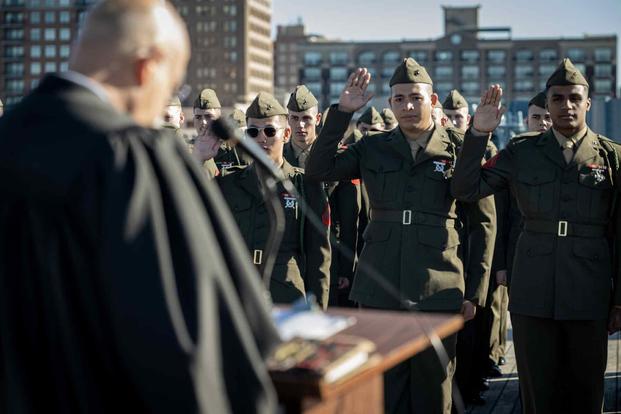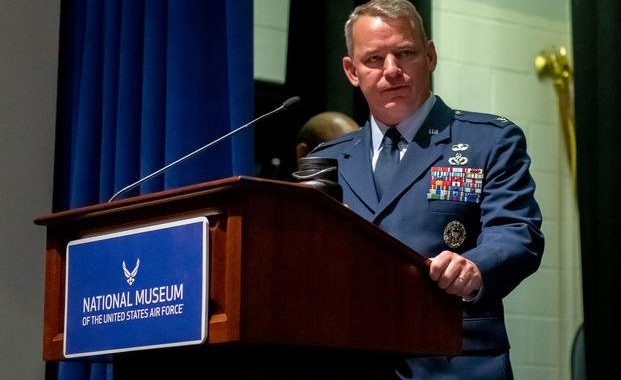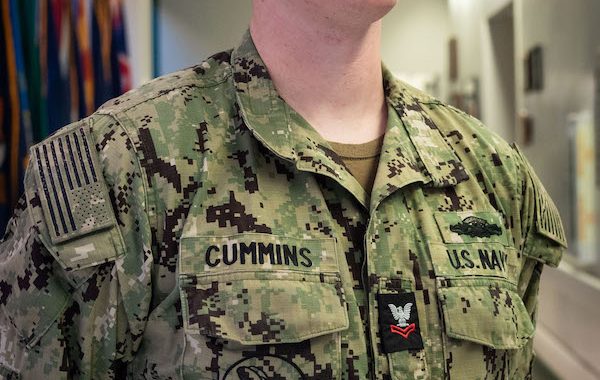Bill to Help Deported Veterans and Non-Citizen Troops Clears House
4 min read
U.S. Marines from 1st Battalion, 8th Marine Regiment, 2d Marine Division, raise their right hand during the Oath of Allegiance aboard the Battleship USS North Carolina, Dec. 2, 2022
Deported veterans would have an easier path to returning to the United States, and non-citizen service members would have earlier opportunities to apply for naturalization under a bill passed Tuesday by the House.
The bill, called the Veteran Service Recognition Act, would also add more hurdles to deporting non-citizen veterans. It cleared the House in a largely party-line 220-208 vote.
“What American would deny that we should treat non-citizen veterans with fairness and compassion,” House Veterans Affairs Committee Chairman Mark Takano, D-Calif., the bill’s sponsor, said on the House floor. “This is an opportunity to honor our brave veterans for their heroism regardless of the country they were born in.”
The bill still needs to pass the Senate in order to become law, an unlikely prospect with just a couple weeks left in this congressional session and Republicans holding enough seats in the upper chamber to block bills they oppose. In passing the bill Tuesday, House Democrats used the last days of their majority to send a message on an issue they’ve been pushing since the Trump administration.
Non-citizens are eligible for expedited citizenship if they serve honorably in the U.S. military. But advocates charge that defense and immigration officials put up too many hurdles in the process and don’t do enough to inform immigrant service members of their eligibility.
Deportations of immigrant veterans garnered significant attention during the Trump administration, which took a hard-line approach to immigration in general.
The Biden administration has sought to roll back some of its predecessor’s policies, including issuing a directive in June saying Immigration and Customs Enforcement, or ICE, will consider U.S. military service when deciding whether to deport veterans.
The Biden administration has also been reviewing deported veterans’ requests for humanitarian parole to reenter the United States under a program launched last year called the Immigrant Military Members and Veterans Initiative, or IMMVI.
But immigration advocates say the Biden administration has not moved decisively enough. As of June, just 16 veterans and family members had been allowed back into the country under a temporary status known as humanitarian parole through the IMMVI program. Advocacy groups have also accused the Pentagon of slow-walking immigrant service members’ citizenship applications despite a 2020 court order nullifying the Trump administration’s more difficult application process.
“Men and women who served honorably should not face barriers to citizenship or face deportation from the country they served or fought to defend,” the American Legion said in written testimony to the House earlier this year in support of the bill. “It is only right that we recognize their service with the pathways to citizenship they deserve.”
Under the bill approved by the House, non-citizen service members would have to be afforded the opportunity to apply for naturalization as soon as their first day of service. The bill would also call on the Pentagon to have a Citizenship and Immigration Services employee or someone else trained in immigration law stationed at each military entrance processing station to ensure non-citizen recruits have information on naturalization opportunities.
In addition, the bill would allow deported veterans to apply to become legal permanent residents of the United States if they have not been convicted of a serious crime.
And it would create a “Military Family Immigration Advisory Committee” at the Department of Homeland Security to review cases of veterans and their family members facing deportation and make recommendations, based in part on their military record, on whether they should be allowed to stay in the country.
A couple hundred veterans could be affected by the bill, Takano said.
In a statement Tuesday, the White House said it supports the bill and “recognizes the need to improve our laws to better protect noncitizens who honorably serve in the Armed Forces.”
Republicans largely opposed the bill over what they have described as a Biden administration-fueled “crisis” at the U.S.-Mexico border. Republicans cite record numbers of Customs and Border Protection encounters with immigrants at the border and drug seizure numbers.
The bill “creates additional carve outs to an already broken immigration system,” Rep. Mike Bost, R-Ill., the ranking member and likely next chairman of the House Veterans Affairs Committee, said on the floor. “Right now, DHS can’t even do their job of securing the southern border and enforcing immigration law.”
Republicans also argued that most deported veterans have committed other crimes and so are too dangerous to be in the country.
Many deported veterans’ convictions are drug-related, according to a 2019 Government Accountability Office report and some advocates argue that traumatic events in the military and a lack of access to resources afterward often contribute to those crimes.





